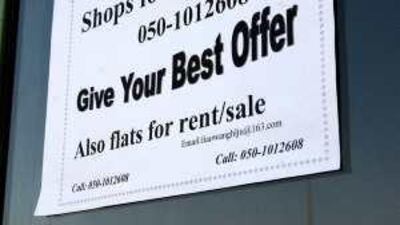Retail rents in Dubai and Abu Dhabi dropped for the first time in at least a decade in the first quarter, a report by an international property consultancy said yesterday. The cost of leasing a new store fell by 11 per cent in Dubai and 3.5 per cent in Abu Dhabi in the first three months of this year, compared with the same period last year, according to the EU-27 Retail Rent Index conducted by CB Richard Ellis.
Mark Morris-Jones, CBRE's senior director for retail and industrial property for MENA, said this was the first reduction in rents in at least 10 years and reflected the decrease in retail sales caused by the global economic downturn. "Demand is fuelled by their expectations of business and how they expect to do in terms of sales," Mr Morris-Jones said. "And if their expectations, given the way the market is in the moment, is that they're not going to do so well, they're not going to have a demand for retail property."
Retail sales in Dubai have dropped between 20 per cent and 25 per cent, according to Majid al Ghurair, the chairman of the Dubai Shopping Malls Group. This, coupled with the amount of new retail space that has come on to the market in recent years, has made Dubai a tenants' market, said Craig Plumb, the head of research for Jones Lang LaSalle MENA. "What you are finding now is retailers have got a lot more choices, so it's a good bargaining position for the retailers," Mr Plumb said.
Rental rates remained higher in Dubai than in the capital, at Dh400 (US$108.9) a square foot in Dubai against Dh280 a sq ft in Abu Dhabi, according to CBRE. Dubai is expected to have 4.25 million square metres (sq m) of retail space by next year, up from 1.17 million sq m in 2006, the research firm RNCOS says. In the past eight months at least four malls have opened in Dubai, including the 1.12 million sq m Dubai Mall, considered one of the world's largest.
Abu Dhabi has about 700,000 sq m of gross leaseable area, and plans to almost double that to 1.2 million sq m in the next two years, according to AT Kearney. Abu Dhabi's rents remain relatively stable because in addition to tight supplies, retail sales have held up in the capital, Mr Morris-Jones said. "There isn't the amount of retail space, but more importantly, it's a more stable market," he said.
"Dubai is very dependent on tourism and tourism has dropped off." But retailers locked into leases have had little success in negotiating discount rates, said Walid Hajj, the chief executive of Cravia, which owns the local licences for Roadster Diner and Cinnabon. Mr Hajj said he has asked for rent reductions at most of Cravia's 35 outlets to compensate for slowing customer traffic but the rates have stayed the same.
He estimated that he pays between Dh400 and Dh1,400 a sq ft. "Dropping down by 11 per cent sounds good but I don't think we've realised it," Mr Hajj said. aligaya@thenational.ae

